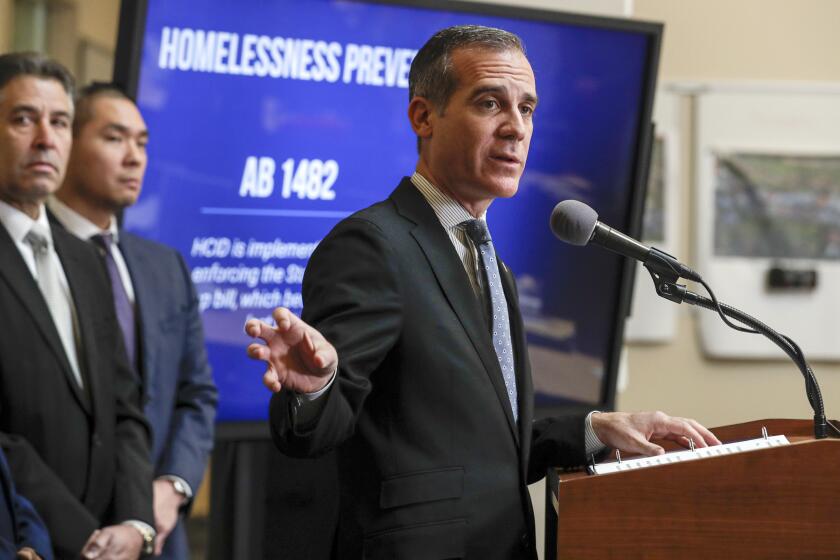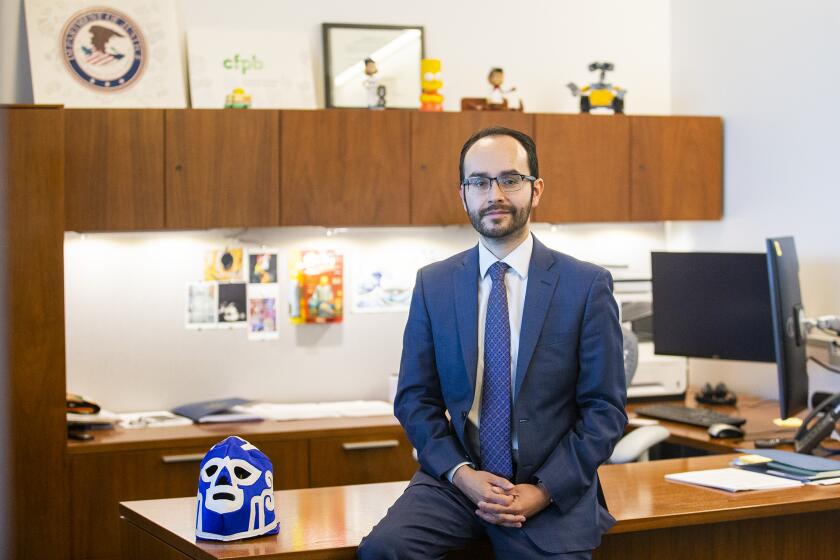Column: At the DWP, the pay is good, the benefits are better and the deals keep getting sweeter

- Share via
More than once over the years, when people have complained about how hard it is to survive in a low-wage economy with such crippling healthcare costs, I’ve recommended they apply for work at the Los Angeles Department of Water and Power.
I was reminded a few days ago, as terms of the new DWP contract were revealed, that this is still solid advice. And there’s more good news: the utility, never far removed from scandal, is hiring.
In a story by Dakota Smith, The Times reported that Mayor Eric Garcetti was backing a handsome pay hike for water and power employees after an 11-0 vote by the Los Angeles City Council.
The highlights:
Roughly 10,000 employees of the all-powerful campaign-donation factory known as Local 18 of the International Brotherhood of Electrical Workers will get raises ranging from 10% to 24% over four years.
All workers will get 3% stocking stuffers as a cash bonus.
On top of those increases, 800 utility workers will get an additional package of raises over the four years ranging from 20% to 41%. In one scenario, some workers’ salaries could rise as much as 74%.
The City Council has approved a plan, supported by Mayor Eric Garcetti, that would give a big pay hike to hundreds of LADWP workers.
And once again, despite years of promises from Garcetti and others to demand employee healthcare contributions, going to the doctor or hospital will continue to be virtually free for the vast majority of workers.
A Garcetti spokesman said the mayor believes “this contract will put the city in a strong position to maintain and attract a skilled workforce to deliver our most critical city services.”
But this is the same mayor who said in 2013, after defeating IBEW-backed candidate Wendy Greuel, that DWP employees needed to start contributing to their healthcare costs. The mayor then held up a contract deal and did win significant concessions, but he wimped out on demanding healthcare contributions.
The same thing happened in the 2017 contract, when handsome raises were awarded, but the healthcare freebie remained in place. So during the Garcetti reign as mayor, that’s strike one in 2013, strike two in 2017, and now strike three.
“It’s outrageous,” Jamie Court, of Consumer Watchdog, said of the new contract.
“The worst part of this deal,” said former L.A. city official Rick Cole, who is returning to work for newly elected controller Kenneth Mejia, is that other city unions “will want to use it as their benchmark, and the city’s about to hit recession revenue shrink.”
To be fair, healthcare ought to be free or at least more affordable for everyone. But that’s a story for another time.
And I should say that not everyone thinks this new DWP contract is out of line. One reason is the contention that compensation is higher at other utilities, some of which have enticed and poached DWP employees by dangling better offers. That’s what Garcetti was getting at in saying this contract will “maintain and attract a skilled workforce.”
A DWP spokesperson, quoting his bosses, said that of the 150 electrical line workers trained in the last five years, 70 left because “our salaries were not competitive.” The DWP says hundreds of vacancies exist because of hiring difficulties, and that’s driving up overtime costs to maintain operations.
Meanwhile, ratepayer advocate Fred Pickel told me he supports the new contract, based in part on his research into pay packages offered by competing utilities. Pickel said the DWP is top of the heap when it comes to healthcare coverage, but when you factor in pay, pensions and other benefits, the DWP’s standing falls.
In charts Pickel provided, the DWP “falls around the median” in average total compensation at $169,000, well below the high of $230,000 and above the low of $118,000.
In base salary alone, DWP custodians make $60,000, painters make $90,000, steam plant mechanics make $107,000, water utility superintendents make $166,000 and electrical services managers make $228,000.
But all these numbers, which aren’t bad to begin with, will rise with the new contract. And healthcare will still be virtually free, for those who choose Kaiser, or close to it for those who choose other plans.
Given the rising personnel and retiree costs, which will come as the DWP confronts green energy costs that will be in the tens of billions of dollars, you’d think there would have been a robust public vetting of this new contract, which will cost between $55 million and $111.8 million a year.
Skeptics should have had a chance to grill DWP officials and demand specific examples of poaching. They should have been able to ask whether a utility that had a comically egregious overbilling fiasco not long ago and watched a recent corrupt GM get hauled off to prison could be trusted to have competently negotiated the new contract.
Sergio Perez, hired as the DWP’s first internal watchdog, is stepping down after only seven months to join the city controller’s office.
Another fair question: How long might it be before ratepayers — who are saddled with both their own healthcare costs as well as those of DWP employees — pay more to turn on their lights and faucets.
But as Smith reported, the City Council — limping along in the wake of the recent racism scandal — opted not to have a public hearing on the new pay package, just like it opted out in 2017. And outgoing Councilmember Paul Koretz, who heads the personnel committee that could have challenged the deal, declined to comment.
“This isn’t about keeping employees for the city,” Court said. “It’s about payback for one of the most connected unions in the city and it’s a going-away gift from politicians who have nothing to lose.”
The IBEW political wing donated in the recent election cycle to Councilmember Curren Price and incoming Councilmembers Traci Park and Tim McOsker. It also pumped more than $1.4 million into a political action committee to support Mayor-elect Karen Bass.
You know the saying. The more things change, the more they stay the same.
If you’re looking for work with good pay and primo benefits, run, don’t walk, to the nearest hiring office of the DWP.
More to Read
Sign up for Essential California
The most important California stories and recommendations in your inbox every morning.
You may occasionally receive promotional content from the Los Angeles Times.













